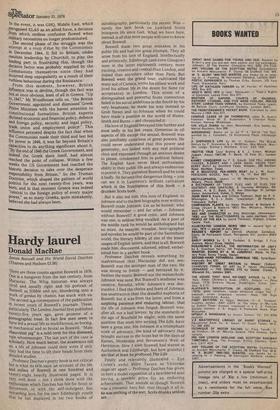Hardy laurel
Donald MacRae
James Boswell and His World David Daiches (Thames and Hudson £3,50)
There are three counts against Boswell in 1976. One is a hangover from the last century, from Macaulay. The Whig historian was always vivid and usually right and his portrait of Boswell as fribble and sot, blundering into a work of genius by chance, has stuck with us. The second iq,a consequence of the publication in recent years of Boswell's journals. These, Particularly The London Journal first published -twenty-five years ago, gave promise of a Pornographic treat. In fact few men seem to have led a sexual life so multifarious, so boring, SO mechanical and so brutal as Boswell. "Male Chauvinist pig" is a mild term for this diseased, vain whoremonger. The last part of the case is seholarly. How much better, the academics tell us, a life of Johnson could they write if only they had the time to lift their heads from their detailed studies.
Professor Daiches's pretty book is not critical hut is what its title says: an account of the life and milieu of Boswell in one hundred and twenty-eight heavily illustrated pages. It is verY well done — not I think done with the enthusiasm which Daiches has felt for Scott or Stevenson, or with the self-indulgent but rewarding love. for his own Edinburgh youth that he has displayed in his two books of
autobiography, particularly the recent Was — surely the best book on Lowland Scots bourgeois life since Galt. What we have here, instead, is all that most people will care to know about Boswell.
Boswell made two great mistakes in his public life and had one great triumph. They all arose from his love of England. Intellectually and artistically, Edinburgh (and even Glasgow) were in the latter eighteenth century more exciting, creative and central than London, and indeed than anywhere other than Paris. But Boswell went the grand tour, cultivated the stony soil of Corsica, wrote his silliest work and lived his silliest life in the desire for fame (or acceptance) in London. This scion of a distinguished and powerful Scots connection failed in his social ambitions in the South by his very brashness; he made his way instead to Grub Street and to Johnson when he could have made a position in the world of Hume, Smith and Burns — and chronicled it.
His love of England betrayed him further and most sadly in his last years. 'Generous in all aspects of life except the sexual, Boswell Was also justifiably conscious of great powers. He could never understand that this power and generosity, not linked with any real political clout and expressed through an anxious desire to please, condemned him to political failure. The English have never liked enthusiastic ability in their public life and always endeavour to punish it. They punished Boswell and he took it badly. He became that dangerous thing — you can see it in Lawrence's brilliant caricature which is the frontispiece of this book — a drunken Scots bore.
But it also led him, this love of England, to Johnson and to the best biography ever written. Boswell made Johnson. Let us be honest: who would remember — and for what — Johnson without Boswell? A good critic, and Johnson was one, is seldom long recalled. As a poet of the middle rank he would be anthologised but no more. As essayist, moralist, lexicographer and novelist he would be part of the Saintsbury .world, the literary history of one of the lesser usages of English letters, and that is all. Boswell made him, discovered, adorned, edited, embellished him in a perfect book. Professor Daiches reveals something by inadvertance that Macaulay did not see. Boswell was the stronger man of the two. He was strong to frenzy — and betrayed by it. Neither the' manic Boswell nor the melancholic Johnson was sane. But Boswell's madness was creative, forceful, while Johnson's was destructive. I find the chains and fears of Johnson less unattractive than the dreadful euphoria of Boswell, but it was from the latter, and from a surpising patience and enduring labour, that the life of Johnson was forged. Boswell was, after all, not a bad lawyer: by the standards of the age of Braxfield he might, with the same qualities that went into writing The Life, have been a great one. His Johnson is a triumphant work of advocacy, the kind of advocacy that brought success in the Scots bar in the days of Kames,, Monbodds and Stevenson's Weir of Hermiston. How I wish Boswell had stayed in Auchinleck and Edinburgh; but how grateful I am that at least he produced The Life.
Finely and relevantly illustrated — Eye Crowe's awful Mitre Tavern as Victorian stage-set apart — Professor Daiches has given us here a model exposition of a bewildered soul paying a terrible price for an enduring achievement. That sounds as though Boswell was a romantic hero but, true though it all is, he was nothing of the sort. Scots drunks seldom are.


























 Previous page
Previous page